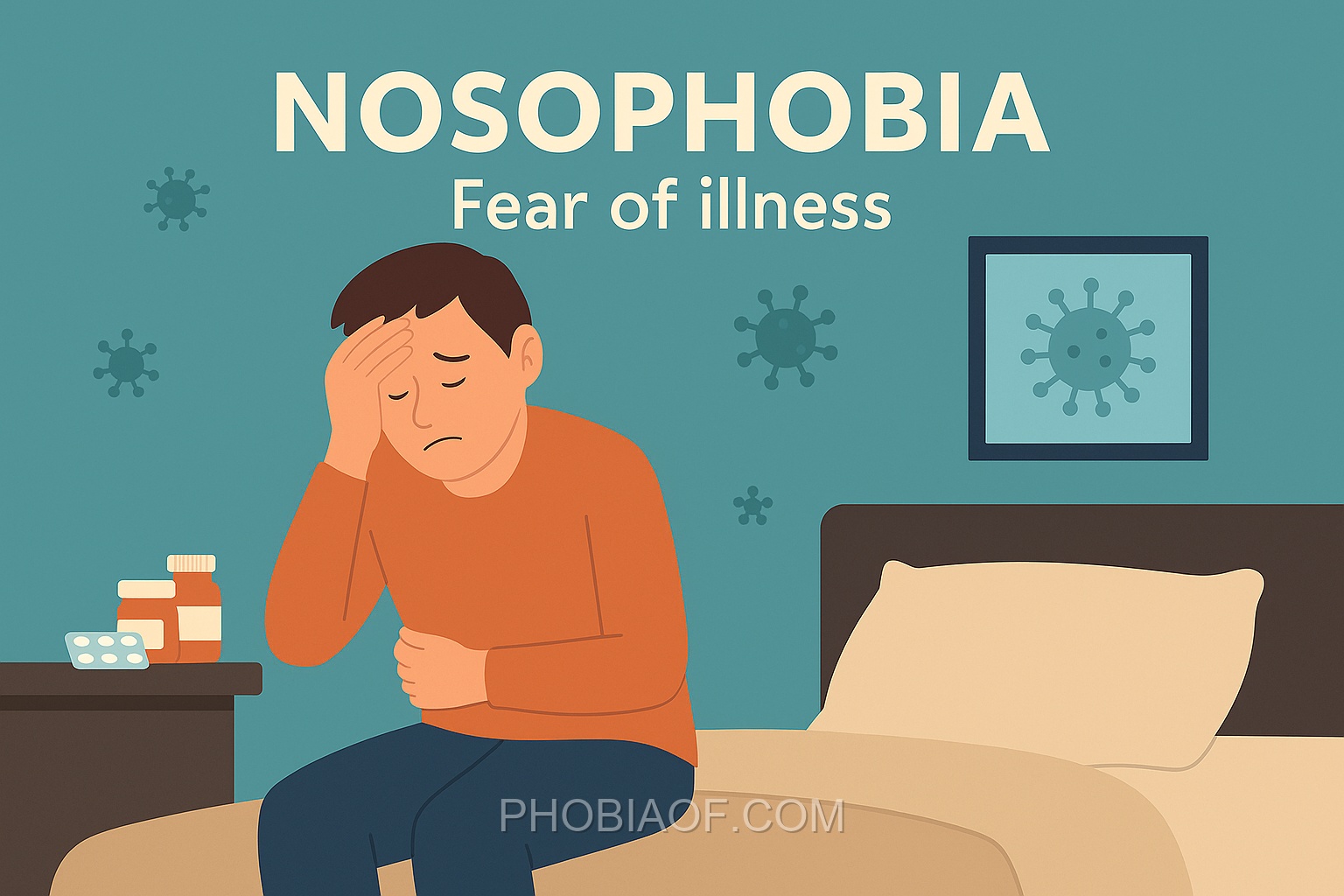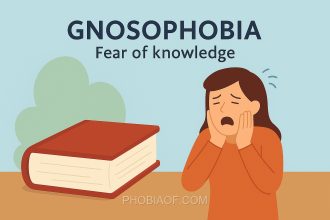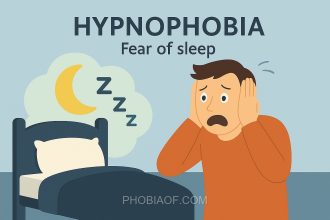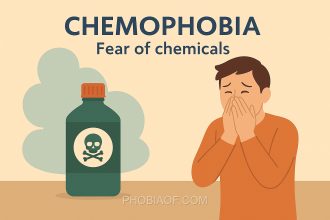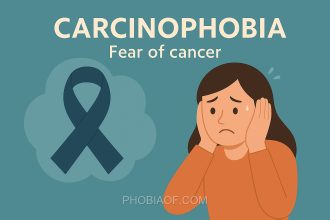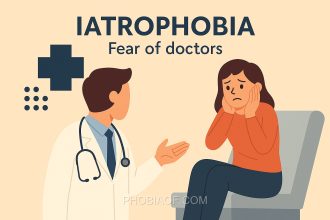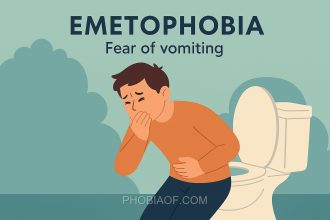Have you ever found yourself overly worried about catching an illness, even when there’s no real reason to think you might be sick? If so, you’re not alone. This type of anxiety is known as Nosophobia.
Nosophobia is a term that comes from the Greek words “nosos,” meaning disease, and “phobos,” meaning fear. It describes an intense, persistent fear of contracting a disease.
For those affected by Nosophobia, everyday situations can become sources of significant stress. They might frequently seek medical reassurance, avoid certain places, or excessively research symptoms and diseases online. This constant worry can interfere with various aspects of life, from work to personal relationships.
Understanding Nosophobia is the first step towards managing it. By recognizing the signs and seeking appropriate support, individuals can learn to cope with their fears in healthier ways.
Causes of Nosophobia
Nosophobia, the fear of developing a disease, can arise from various factors. Understanding these causes can help in addressing the phobia effectively. Below, we explore some of the potential reasons why someone might develop this fear.
- Genetic Predisposition: Like many anxiety-related conditions, nosophobia may have a genetic component. If a person has family members with anxiety disorders, they might be more susceptible to developing similar fears.
- Traumatic Experiences: Experiencing or witnessing a severe illness can trigger nosophobia. For instance, if someone has gone through a health scare or seen a loved one suffer from a disease, they might become excessively fearful of becoming ill themselves.
- Learned Behavior: Nosophobia can also be learned from others. If a person grows up in an environment where family members are overly concerned about health, they may adopt similar fears.
- Psychological Factors: Individuals with existing anxiety disorders are more prone to developing nosophobia. Their heightened sense of worry and fear can extend to concerns about health and illness.
- Environmental Influences: Media coverage of disease outbreaks can increase fear of illness. Constant exposure to information about health risks can exacerbate concerns, especially if the information is sensationalized or alarming.
Research into phobias, including nosophobia, suggests that a combination of these factors often contributes to the development of the fear. Studies indicate that while some people may have a biological predisposition, environmental factors often trigger the phobia.
Overall, recognizing the causes of nosophobia is crucial in developing effective treatment and coping strategies. Addressing these root causes can help individuals manage their fears and improve their quality of life.
Symptoms of Nosophobia
Nosophobia, the intense fear of developing a disease, can cause significant distress and interfere with daily life. Individuals with this phobia experience a range of symptoms, both physical and emotional, that can be quite debilitating. Recognizing these symptoms is crucial for understanding and addressing the condition.
Physical Symptoms:
- Panic attacks characterized by intense fear and discomfort.
- Sweating, often excessive and occurring in stressful situations.
- Rapid heartbeat, especially when thinking about or exposed to disease-related information.
- Shortness of breath or a sensation of choking.
- Shaking or trembling, indicating high levels of anxiety.
- Nausea or stomach discomfort when confronted with disease-related thoughts or media.
Emotional and Behavioral Symptoms:
- Overwhelming dread at the thought of contracting a disease.
- Avoidance of places, people, or media that might relate to illness or disease.
- Constant checking of body for signs of illness, leading to obsessive thoughts.
- Difficulty concentrating on tasks due to persistent worry about health.
- Irrational belief that minor symptoms are indicative of a serious illness.
- Seeking frequent reassurance from medical professionals despite negative test results.
Severe nosophobia can significantly interfere with daily life, affecting work, relationships, and overall well-being, as the individual’s focus on avoiding perceived threats becomes all-consuming.
Treatment for Fear of Illness
Feeling anxious about illness is a common experience, but when this fear becomes overwhelming, it may be classified as Nosophobia. The good news is that this phobia can be treated and managed over time. With the right approach, individuals can regain control over their lives and reduce the impact of this fear. Below are some of the most effective treatment options and coping strategies to help overcome Nosophobia.
Proven Therapies
Several therapeutic approaches have been shown to effectively address Nosophobia:
- Exposure Therapy: This therapy involves gradually facing the fear in a controlled and safe environment. Over time, repeated exposure can help reduce the fear response associated with illness-related thoughts or situations.
- Cognitive-Behavioral Therapy (CBT): CBT works by identifying and changing the fearful thoughts and beliefs that maintain the phobia. It helps individuals develop healthier thought patterns and coping mechanisms.
- Counseling: Speaking with a mental health professional provides a supportive space to explore fears and anxieties. Counselors can offer guidance and strategies tailored to the individual’s needs.
Self-Help Coping Techniques
In addition to professional therapies, there are several self-help techniques that can complement treatment:
- Relaxation Exercises: Techniques such as deep breathing, progressive muscle relaxation, and visualization can help reduce anxiety levels and promote a sense of calm.
- Meditation: Regular meditation practice can enhance mindfulness and help individuals become more aware of their thoughts, reducing the intensity of fear responses.
- Support Groups: Joining a group of individuals who share similar experiences can provide comfort, understanding, and shared coping strategies.
Medication
In severe cases of Nosophobia, medication such as anti-anxiety drugs may be prescribed. However, it is important to focus on therapy and coping skills as the primary methods of treatment. Medication can be an adjunct to therapy, providing relief while individuals work through their fears.
It is crucial to remember that seeking professional help is a positive step if Nosophobia is interfering with your life. Therapists and counselors are equipped to guide you through this process with expertise and care.
Overcoming Nosophobia is possible, and with time, patience, and the right support, you can manage and reduce your fear of illness effectively. Take the first step today by reaching out for professional help and exploring these treatment options.
Conclusion
Understanding the causes and symptoms of nosophobia, the fear of illness, is a crucial step towards empowerment and taking control of one’s mental health. By recognizing the triggers and manifestations of this phobia, individuals can begin to address their fears with greater awareness and clarity.
It is important to remember that many people successfully overcome or manage their phobias with time, patience, and the right support. If you or someone you know is struggling with nosophobia, consider reaching out to a healthcare professional or therapist for guidance. Therapy and medical advice can provide the tools needed to effectively cope with and reduce fear, leading to a more balanced and fulfilling life.
In conclusion, while nosophobia can be challenging, there is hope and help available. Embracing the journey towards understanding and managing your fears can lead to significant personal growth and well-being. Remember, you are not alone, and with the proper support, overcoming this phobia is entirely possible.
